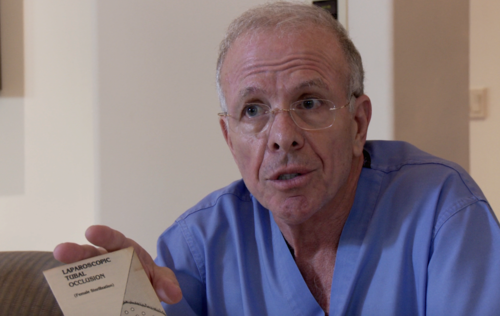SYNOPSIS
They came to have their babies. They went home sterilized. The story of immigrant mothers who sued county doctors, the state, and the U.S. government after they were pushed into sterilizations while giving birth at the Los Angeles County-USC Medical Center during the 1960s and 70s. Led by an intrepid, 26-year-old Chicana lawyer and armed with hospital records secretly gathered by a whistle-blowing young doctor, the mothers faced public exposure and stood up to powerful institutions in the name of justice.
THE CHARACTERS
LOS ANGELES COUNTY-USC MEDICAL CENTER (LAC+USC) is a public hospital located in the heart of the largely immigrant community of Los Angeles’s eastside. The exterior was used as the setting for the popular soap opera “General Hospital.” We filmed in the old hospital buildings, which still stand but are now shuttered. A new facility has been built nearby. At the time of the Madrigal v. Quilligan case, OB-GYN at the hospital was one of the world’s premiere research institutions in the field.
CONSUELO HERMOSILLO is most comfortable cooking up exquisite dishes from her hometown of Vera Cruz, Mexico and today is the head chef for her son Oscar’s string of successful restaurants. She has always fought on behalf of her children and her community. But in audio interviews recorded in the 1970s, it is clear the sterilization left her shaken and vulnerable.
MARIA HURTADO is a feisty and funny woman who loves to dance, and who finds sly ways of subverting traditional boundaries inside and outside the home. Back in the day, she used to sneak out with her daughter to cruise Whittier Boulevard. She talks about her romance with her husband, SALVADOR, with a glint in her eye. The HURTADO’s valued family above all, but their plans were cut short.
DOLORES MADRIGAL and her husband worked at factory jobs to save up for a house and family. When her learned she was sterilized, DOLORES’S husband was not only angry at the hospital, he directed his accusations of betrayal at her. She was the lead plaintiff in the civil rights lawsuit, Madrigal v. Quilligan.
MARIA FIGUEROA is a vivacious woman who raised her on a hilly street in east Los Angeles. She savored her peaceful routine. When she was not at work, she was always with her kids. But when she discovered that she was sterilized at LAC+USC, her life and marriage took an unexpected turn.
ANTONIA HERNÁNDEZ migrated from Mexico as a child and grew up in east Los Angeles. Her mother gave birth to her little sister at LAC+USC. Hernández was a 26-year-old UCLA Law School graduate, working at the Los Angeles Center for Law & Justice, when she met DR. ROSENFELD. She and lead attorney, CHARLES NABARRETTE, who was all of 29-years old, filed the landmark civil rights lawsuit Madrigal v. Quilligan. HERNÁNDEZ went on to become President of the Mexican American Legal Defense & Education Fund and is now the CEO of the California Community Foundation.
DR. EDWARD JAMES QUILLIGAN was the esteemed and beloved head of the Women’s Hospital at LAC+USC when the sterilizations were taking place. Formerly the Chair of OB-GYN at Yale, QUILLLIGAN is preeminent in his field. A pioneer of maternal fetal medicine, he is former president of the American Obstetrics and Gynecology Society. As a main defendant in the Madrigal v. Quilligan lawsuit, he steadfastly denied that any improprieties took place. MARIA FIGUEROA is a vivacious woman who raised her on a hilly street in east Los Angeles. She savored her peaceful routine. When she was not at work, she was always with her kids. But when she discovered that she was sterilized at LAC+USC, her life and marriage took an unexpected turn.
DR. BERNARD ROSENFELD was a young resident at LAC+USC when he began to suspect that Mexican immigrant women were being sterilized by tubal ligation without their consent. The grandson of a Torah scholar, DR. ROSENFELD felt it was his duty to speak up about the practice. He risked his career in his relentless pursuit of justice, confronting DR. QUILLIGAN and doctors at LAC+USC, and secreting medical evidence to the young Mexican American lawyers who agreed to take the case.
GLORIA MOLINA, the eldest of ten children grew up on the eastside. She was a young legal secretary and president of the nascent feminist organization, Comisión Feminil, when the group signed on as class representatives for the Madrigal v. Quilligan suit. MOLINA went on to a groundbreaking career in electoral politics. She was the first Latina elected to the California State Legislature, Los Angeles City Council, and Los Angeles County Board of Supervisors, She implemented reforms at the hospital and oversaw the construction of a new LAC+USC facility.MARIA FIGUEROA is a vivacious woman who raised her on a hilly street in east Los Angeles. She savored her peaceful routine. When she was not at work, she was always with her kids. But when she discovered that she was sterilized at LAC+USC, her life and marriage took an unexpected turn.
FRANK CRUZ was raised in an immigrant family in East Los Angeles. He taught Chicano history before becoming the first Latino anchor on Los Angeles television news. He was the only TV reporter to cover the Madrigal v. Quilligan trial. CRUZ went on to co-found Telemundo, and twice served as Chair of the Corporation for Public Broadcasting. He is currently a member of the Board of Trustees of the University of Southern California.










